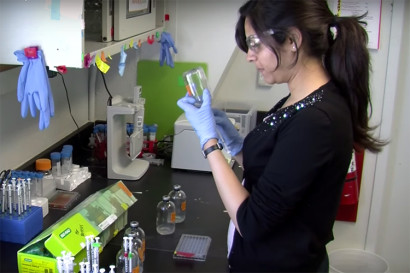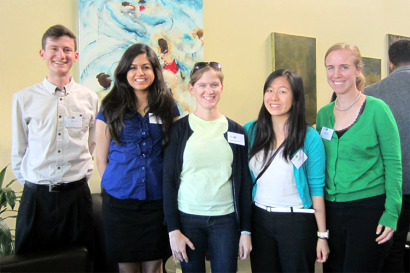Shilpi Mathrani wanted a career in the biomedical field. To a student, though, the industry can seem like an exclusive club.
For Mathrani, UC Berkeley’s Bio-Manufacturing to Market program held the key.

The internship program, now in its fourth year, gives students a rare opportunity to learn how the biomedical industry — which includes biotech, pharmaceuticals, medical devices and medical equipment — works on a day-to-day basis.
The pilot program connects science and engineering undergrads from the campus and local community colleges with biomedical startups in the East Bay. Interns can opt to spend a semester or a year (or sometimes longer, in special cases) working as a paid intern at a biomedical startup, where they work on everything from conception and prototyping to scaling up and marketing a product.
Mathrani, now a Berkeley alum with a master’s degree in engineering, worked for Mango Materials — an Albany-based company that produces biodegradable plastics from waste methane gas — for more than two years as part of the program.
She says working for the small startup gave her the opportunity to learn all aspects of how a biomedical business is run. “The program helped me experience the research side of things and the entrepreneurship side of things,” she says. “I always had a new problem to tackle.”
And while students are getting hands-on experience in their field, the startups have top-notch students helping them build their companies in a competitive market.

When Mathrani joined Mango Materials in 2012, the company had four full-time employees. Now it has a staff of 20. Anne Schauer-Gimenez, vice president of methane marketing, says Mathrani and other interns have contributed to the success of the startup.
“As the students grew as researchers, they were able to contribute to the planning and execution of our work,” says Schauer-Gimenez. “It was fantastic to have brilliant, hard-working students join our team.”
Mathrani now works at a consulting firm in the Bay Area that provides professional advice to pharmaceutical and healthcare companies. She says the experience she gained through the internship greatly contributed to her successful career after Berkeley.
The Bio-Manufacturing to Market pilot project is supported through the Advanced Manufacturing Jobs and Innovation Challenge with funding from the U.S. Department of Energy. The program is part of the Biomedical Manufacturing Network, co-founded by UC Berkeley, which works to support biomedical entrepreneurship, manufacturing and commercialization.
